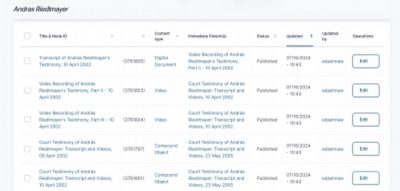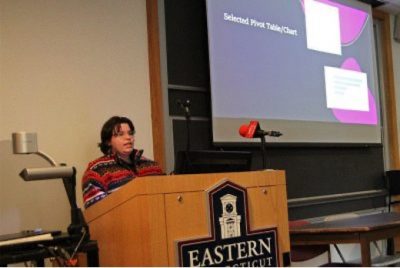My Story
For the past three years, I have devoted my academic and professional journey to digitizing and preserving history. As a Master of Arts student in Human Rights with a Bachelor of Arts in History, I have witnessed firsthand the critical role that digital history and archiving play in making history accessible, preserving fragile artifacts, and ensuring we remember and learn from past atrocities, such as genocides. Achieving this in such a short time has been a dream come true.
As a former homeschooler, my educational interests were diverse, but history always stood out. My mother encouraged my sister and me to explore beyond our textbooks, borrowing books from the local library and watching documentaries on various historical topics. Growing up in Central Massachusetts, frequent visits to Old Sturbridge Village ignited my passion for history. As I approached college, I knew I wanted to major in history, but I also pursued psychology. Despite excelling academically, my passion for psychology waned, while my interest in history deepened. I struggled with how I could help people with a history degree.
During spring semester of my sophomore year, I interned at the Vernon Historical Society, where I learned valuable skills such as collation, data entry, archival research, phone etiquette, file archiving, archival preservation, nonprofit organization operations, and time management. This experience provided me with purpose and direction. When I transferred to Eastern Connecticut State University from Nichols College, I was determined to contribute to something larger than myself.
In my last semester at Eastern Connecticut State University, I worked on the Digital Windham project under Dr. Jamel Ostwald’s direction. This project involved studying the social and cultural groups of Willimantic in 1910 and digitizing historical records to provide a comprehensive view of the town’s past. I curated an Omeka exhibit and presented my work to the university, showcasing how digital tools can bring community history to life.
Currently, I am expanding my digital history and archiving skills further in my M.A. program. In Catherine Masud’s Human Rights Archives class, I crafted a script for a short documentary on the Bosnian Genocide, focusing on Ron Haviv, a prominent photojournalist who shared his oral history with the class and the early days of the war in Bijeljina. I am also collaborating on the ICTY Digital Archives at the University of Connecticut, curating a collection for Dr. Andras Riedlmayer. This practicum has been transformative, allowing me to develop new skills, including using the Connecticut Digital Archive (CTDA) website, managing spreadsheet ingests, and enhancing my research capabilities. Additionally, I have gained web design experience, broadening my understanding of how digital tools can enhance archival work. This practicum has reignited my passion for archiving and digital history, inspiring me to pursue this as my dream career.
Lessons Learned
Accessibility and Preservation
Digitizing history makes it accessible to a global audience and preserves fragile artifacts. Digital archives allow researchers, students, and the public to access materials that would otherwise be confined to physical locations, promoting a more inclusive understanding of history and enabling diverse narratives to be explored and understood.

Remembrance and Learning
Archival work serves as both a form of remembrance and a tool for learning. Creating collections helps us remember significant events and individuals, fostering a connection to our shared past. This is especially important for remembering genocides, as it ensures that the horrors of these atrocities are not forgotten. Digital archives play a crucial role in combating misinformation and preserving the truth.

Challenges and Digital History
While digitization offers many benefits, it is essential not to rely solely on technology. Digital collections must be complemented by proper archival procedures to ensure the physical preservation of historical items. Archivists must adhere to best practices in storing and caring for physical artifacts alongside their digital counterparts to safeguard history for future generations.

Final Reflections
Digital history and archiving are vital for making history accessible, preserving the past, and ensuring we remember and learn from events such as genocides. My journey in this field has shown me the immense value of these practices and the challenges we must navigate to protect our historical heritage. Balancing digital tools with proper archival care allows us to safeguard history for future generations.
Looking ahead, I hope to pursue a Ph.D. in History with a focus on Holocaust and Genocide Studies. This advanced study will deepen my understanding of these critical issues and enable me to continue contributing to the preservation and remembrance of our shared past. By combining rigorous academic research with practical archival work, I aim to help ensure that the lessons of history are never forgotten and that we remain vigilant against the recurrence of such atrocities.

About the Author
Emma Dashnaw (She/Her) is a passionate and driven M.A. student in Human Rights at the University of Connecticut, holding a B.A. in History with a minor in Pre-Law from Eastern Connecticut State University. Emma's interests and expertise lie in archival research, digital history, and the acknowledgment and remembrance of genocide. She has interned at the Vernon Historical Society, contributed to the Digital Windham project, and created a documentary capturing the early days of the Bosnian War under the direction of Catherine Masud. Currently, Emma, alongside a team, is curating Andras Riedlmayer's collection on the UConn ICTY Digital Archives page. Emma is also pursuing a project titled "The Tapestry Within: Unraveling Family Stories, Weaving Personal History," which reflects on her life and family history. Her work in human rights and history has reinforced her passion for archival work, for which she plans to pursue a Ph.D. in History with a focus on Holocaust and Genocide Studies.
Here are some links to Emma's previous projects: